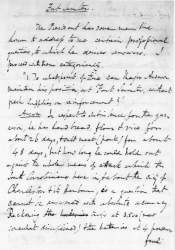Record Data
Transcription
Fort Sumter.
The President has done me the honor to address to me certain professional questions, to which he desires answers. I proceed with them categorically.
"1. To what point of time can Major Anderson maintain his position, at Fort Sumter, without fresh supplies or reinforcements?"
Answer. In respect to subsistence, for the garrison, he has hard bread, flour & rice for about 26 days, & salt meat (pork) for about 48 days; but how long he could hold out against the whole means of attack which the South Carolinians have in, & about the city of Charleston & its Harbour, is a question that cannot be answered with absolute accuracy. Reckoning the batteries troops at 3,500 (now somewhat disciplined) & the batteries at 4 powerful land, & at least one floating -- all mounting guns & mortars of large calibre, & of the best patterns; -- & supposing those means to be skillfully & vigorously employed -- Fort Sumter with its less than 100 men -- including common laborers & musicians -- ought to be taken by a single assault, & easily; if harrassed perseveringly for several previous days & nights by threats & false attacks, with the ability -- from the force of overwhelming numbers -- of converting one out of every three or four of those, into a real attack.
"2. Can you with all the means now in your control, supply or reinforce Fort Sumter within that time?"
Answer. No: Not within many months. See answer to No. 3.
"3. If not, what amount of means, & of what description, in addition to that already at your control, would enable you to supply & reinforce that fortress within the time?"
Answer. A fleet of war vessels & transports, 5,000 additional regular troops & 20,000 volunteers, in order to take all the batteries in the Harbor of Charleston (including Ft. Moultrie) after the capture of all the batteries in the approach or outer Bay. And to raise, organize & discipline such an army, would require new acts of Congress & from six to eight months.
Respectfully submitted.
Winfield Scott.
Head Qrs. of the Army,
Washington, Mar. 11, 1861.







